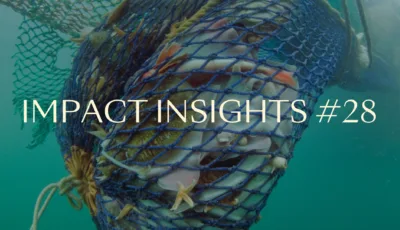Climate Warnings and the Push for Simpler Regulations

Ready to catch up on the latest in impact investing and sustainability? Here are the key industry updates you need to know: from the EU's plans to simplify environmental regulations, to Biden’s last push for climate action amid political uncertainty, and a record-breaking forecast for global temperatures. Plus, insights on UN investment calls for sustainable agriculture and Norway’s pause on deep-sea mining—discover the pivotal developments shaping our planet’s future.
■ EU to simplify environmental regulations in efforts to balance sustainability with competitiveness
The European Commission is set to simplify key environmental regulations to boost Europe's economy and enhance competitiveness against Asia and America. EU Commisionn President Ursula von der Leyen announced that three major regulations, the Corporate Sustainability Reporting Directive (CSRD), the Corporate Sustainability Due Diligence Directive (CSDDD), and the EU Taxonomy Regulation would be simplified to reduce bureaucratic burdens on corporations. The directives were introduced as part of the European Green Deal in an effort to increase transparency on environmental footprint and help channel capital to sustainable activities. While these sustainability regulations are among the most far-reaching globally, critics fear that revisions may weaken social and environmental requirements. On the other hand, simplified reporting could make sustainability more accessible and actionable for all businesses, ensuring that sustainability reporting becomes a bridge - rather than a barrier - to funding and optimising sustainability performance.
■ Biden race to increase US climate ambitions as Trump's victory threatens progress
Joe Biden has formally submitted new climate targets, known as Nationally Determined Contributions (NDCs), to the United Nations under the Paris Agreement. The updated NDCs commit the U.S. to cutting emissions by over 60% by 2035 compared to 2005 emissions, a 10% increase from the previous target of 50%. “I’m proud that my administration is carrying out the boldest climate agenda in American history,” the president stated. This move comes just weeks before Biden is set to leave office, with President-elect Donald Trump already signaling plans to dismantle his predecessor’s climate initiatives. Trump’s anti-climate rhetoric has spurred Biden to accelerate key environmental actions in his final months in office. Since Election Day, the Biden administration has unveiled major rules, including a sweeping crackdown on methane emissions and a ban on new coal mining leases on federal lands. Both measures, however, are likely to be reversed shortly after Trump takes office. Donal Trump's victory has introduced significant uncertainty regarding the future of American climate initiatives, as his campaign pledged to withdraw from the Paris Agreement and heavily support fossil fuel industries. The long-term implications for global climate efforts remain uncertain, underscoring the critical need for Europe and other continents to maintain and strengthen their climate commitments to offset potential setbacks from the U.S. policy shift.
■ 2024 set to be hottest year on record, capping the warmest decade ever
The World Meteorological Organization (WMO) issued a red alert once again in its State of the Climate 2024 update, as 2024 is on track to become the warmest year on record. The report noted that from January to September 2024, the global mean temperature was 1.54°C above the pre-industrial average, driven in part by the El Niño event. However, WMO Secretary-General Celeste Saulo emphasized that these numbers should not be seen as a failure to meet the Paris Agreement's goals of keeping the long term temperature below 2°C. This is because global daily, monthly and annual temperatures are prone to large variations, partly because of natural phenomena such as El Nino, and should not be equated to long-term temperatures. Nonetheless, every fraction of a degree of warming matters and poses grave risks to our ecosystems. In his New Year message, UN Secretary-General António Guterres underscored the severity of the situation: "This is climate breakdown — in real time. We must exit this road to ruin — and we have no time to lose. In 2025, countries must put the world on a safer path by dramatically slashing emissions and supporting the transition to a renewable future," he said. The coming year will be crucial, as global leaders face increasing pressure to take immediate and bold action to address the accelerating climate crisis. COP30 in Brazil, scheduled for November 2025, will hopefully be a movement for strengthened and reaffirmed targets.
■ UN calls for $2.6 trillion investment to combat global land degradation and boost sustainable agriculture
The United Nations has called for a $2.6 trillion investment by 2030 to combat land degradation and desertification globally. The Executive Secretary of the UN Convention to Combat Desertification (UNCCD), Ibrahim Thiaw, emphasized the urgency of the funding ahead of the international talks in Riyadh in Dember. The conference aimed to enhance drought resilience, strengthen legal commitments, and secure necessary financing. Thiaw highlighted the significant role of the private sector, which currently contributes only 6% of the required funds, despite being a major driver of land degradation through food production. The call for investment coincides with other global UN meetings focused on climate change and biodiversity, where financing remains a significant challenge. Investments in sustainable farming practices could help tackle the root causes of land degradation, particularly by improving soil health, water management, and biodiversity.
■ Norway forced to pause plans to deep-sea mining in the Arctic amid growing focus on biodiversity
Norway’s plans to begin deep-sea mining explorations were halted this month, a decision hailed by environmental groups as a “historic win” for ocean protection. In January 2024, Norway became the first country in the world to open the doors to commercial-scale deep-sea mining when its parliament approved plans to issue licenses for mapping and exploring seabed minerals. The deep sea is rich in minerals critical for green technologies, such as lithium, scandium, and cobalt, which are essential for electrification. While these minerals are also found on land, their availability is limited to a few countries. The Norwegian government argued that exploration was necessary to reduce supply chain risks and challenge China and Russia’s dominance in rare earth minerals. However, during the latest government budget negotiations, the Socialist Left Party blocked the first licensing round, scheduled for 2025, by making their support for the government’s budget contingent on pausing the controversial project. This pause, together with numerous controversies globally surrounding the exploration and exploitation of untouched nature, under and above water, indicate a shift whereby the “green transition” is no longer accepted by civil society as a justification to move forward with projects reposonsbile for environmental degredation.


